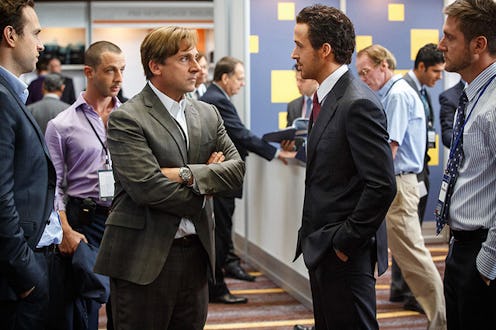In case you somehow forgot, the 2008 financial crisis was kind of a big deal. The stock market was crashing, the government was bailing out banks, and most people (present company included) didn't know what was going on. Now a new film is going to shed some light on what happened, but how accurate is The Big Short ? After all, the film is co-written and directed by Adam McKay, who also co-wrote and directed such fact-based films as Anchorman, Talladega Nights, and Step Brothers. OK, so McKay's forte hasn't exactly been hard-hitting biopics throughout his career, but does that mean The Big Short is the director's next farce? Or is the former Saturday Night Live head writer trying something new with the film by taking a serious turn?
The answer partly lies in another man: Michael Lewis. Lewis wrote the book The Big Short: Inside the Doomsday Machine, back in 2010. His book is a nonfiction take on the financial meltdown of 2008, focusing on some of the key people who saw the writing on the wall and were able to profit from it. Since Lewis's book is nonfiction, and the film is based upon it, the movie ends up being mostly true. But there are a few liberties that the film takes that are not in the book and did not happen in real life. Hey, it's Hollywood.
For one, most characters in the film are simply based on real people rather than playing them straight up. Steve Carrell plays Mark Baum, who is based on hedge fund manager Steve Eisman; Ryan Gosling is Jared Vennett, who was inspired by Deutsche Bank trader Greg Lippmann; and Brad Pitt portrays Ben Rickert instead of Ben Hockett, one of the founders of Cornwall Capital. But one character who didn't undergo a name change is former doctor and Scion Capital founder Michael Burry, who is played by Christian Bale in the film.
As for the story, McKay pretty much sticks to the book save for two details, as the director told The Playlist, "The movie is entirely accurate except for two things that aren't completely true." The first of these has to do with the possibility of Morgan Stanley going under, which McKay used as more of a threat in the movie than it was in real life in order to increase the stakes for the characters and make it more dramatic. The second aspect of the film that's untrue is actually less dramatic than in real life, however. In the movie, there is a family tragedy involving the brother of Carrell's character. But in actuality, that tragedy was worse because it involved a young child. The real family had asked that it be omitted from the film, and McKay obliged and changed the victim to the brother with the family's permission.
So other than the names and a couple small details, you can look to The Big Short to be an accurate retelling of Michael Lewis's book of the same name, which is itself a fact-based account of the 2008 financial meltdown. Knowing this, maybe I'll finally be able to figure out what really happened in 2008 by watching this film... or at least I hope I will.
Images: Paramount Pictures; giphy.com
